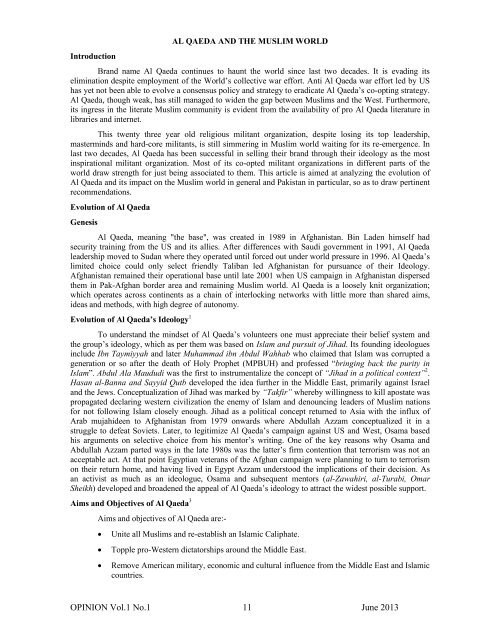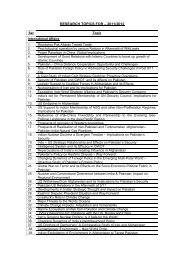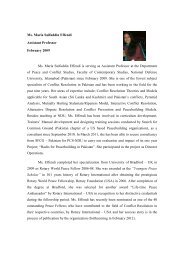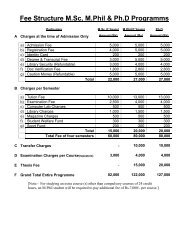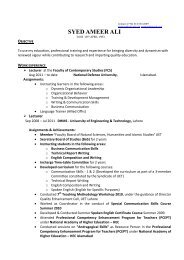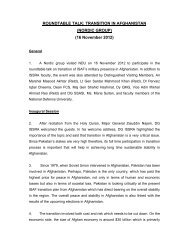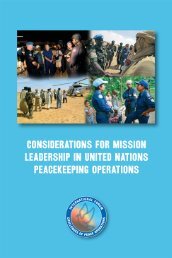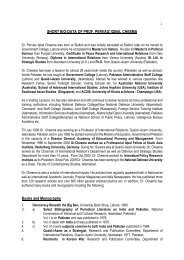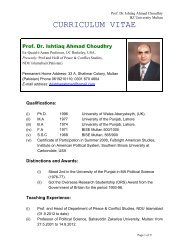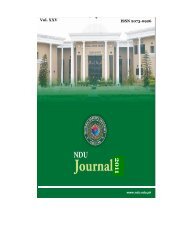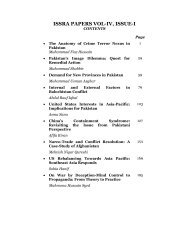OPINION Vol.1, No.1 June 2013 - National Defence University
OPINION Vol.1, No.1 June 2013 - National Defence University
OPINION Vol.1, No.1 June 2013 - National Defence University
Create successful ePaper yourself
Turn your PDF publications into a flip-book with our unique Google optimized e-Paper software.
Introduction<br />
AL QAEDA AND THE MUSLIM WORLD<br />
Brand name Al Qaeda continues to haunt the world since last two decades. It is evading its<br />
elimination despite employment of the World’s collective war effort. Anti Al Qaeda war effort led by US<br />
has yet not been able to evolve a consensus policy and strategy to eradicate Al Qaeda’s co-opting strategy.<br />
Al Qaeda, though weak, has still managed to widen the gap between Muslims and the West. Furthermore,<br />
its ingress in the literate Muslim community is evident from the availability of pro Al Qaeda literature in<br />
libraries and internet.<br />
This twenty three year old religious militant organization, despite losing its top leadership,<br />
masterminds and hard-core militants, is still simmering in Muslim world waiting for its re-emergence. In<br />
last two decades, Al Qaeda has been successful in selling their brand through their ideology as the most<br />
inspirational militant organization. Most of its co-opted militant organizations in different parts of the<br />
world draw strength for just being associated to them. This article is aimed at analyzing the evolution of<br />
Al Qaeda and its impact on the Muslim world in general and Pakistan in particular, so as to draw pertinent<br />
recommendations.<br />
Evolution of Al Qaeda<br />
Genesis<br />
Al Qaeda, meaning "the base", was created in 1989 in Afghanistan. Bin Laden himself had<br />
security training from the US and its allies. After differences with Saudi government in 1991, Al Qaeda<br />
leadership moved to Sudan where they operated until forced out under world pressure in 1996. Al Qaeda’s<br />
limited choice could only select friendly Taliban led Afghanistan for pursuance of their Ideology.<br />
Afghanistan remained their operational base until late 2001 when US campaign in Afghanistan dispersed<br />
them in Pak-Afghan border area and remaining Muslim world. Al Qaeda is a loosely knit organization;<br />
which operates across continents as a chain of interlocking networks with little more than shared aims,<br />
ideas and methods, with high degree of autonomy.<br />
Evolution of Al Qaeda’s Ideology 1<br />
To understand the mindset of Al Qaeda’s volunteers one must appreciate their belief system and<br />
the group’s ideology, which as per them was based on Islam and pursuit of Jihad. Its founding ideologues<br />
include Ibn Taymiyyah and later Muhammad ibn Abdul Wahhab who claimed that Islam was corrupted a<br />
generation or so after the death of Holy Prophet (MPBUH) and professed “bringing back the purity in<br />
Islam”. Abdul Ala Maududi was the first to instrumentalize the concept of “Jihad in a political context” 2 .<br />
Hasan al-Banna and Sayyid Qutb developed the idea further in the Middle East, primarily against Israel<br />
and the Jews. Conceptualization of Jihad was marked by “Takfir” whereby willingness to kill apostate was<br />
propagated declaring western civilization the enemy of Islam and denouncing leaders of Muslim nations<br />
for not following Islam closely enough. Jihad as a political concept returned to Asia with the influx of<br />
Arab mujahideen to Afghanistan from 1979 onwards where Abdullah Azzam conceptualized it in a<br />
struggle to defeat Soviets. Later, to legitimize Al Qaeda’s campaign against US and West, Osama based<br />
his arguments on selective choice from his mentor’s writing. One of the key reasons why Osama and<br />
Abdullah Azzam parted ways in the late 1980s was the latter’s firm contention that terrorism was not an<br />
acceptable act. At that point Egyptian veterans of the Afghan campaign were planning to turn to terrorism<br />
on their return home, and having lived in Egypt Azzam understood the implications of their decision. As<br />
an activist as much as an ideologue, Osama and subsequent mentors (al-Zawahiri, al-Turabi, Omar<br />
Sheikh) developed and broadened the appeal of Al Qaeda’s ideology to attract the widest possible support.<br />
Aims and Objectives of Al Qaeda 3<br />
Aims and objectives of Al Qaeda are:-<br />
<br />
<br />
<br />
Unite all Muslims and re-establish an Islamic Caliphate.<br />
Topple pro-Western dictatorships around the Middle East.<br />
Remove American military, economic and cultural influence from the Middle East and Islamic<br />
countries.<br />
<strong>OPINION</strong> <strong>Vol.1</strong> <strong>No.1</strong> 11 <strong>June</strong> <strong>2013</strong>


